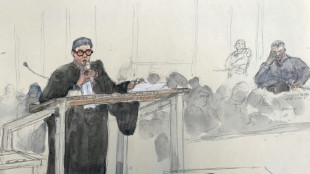
-
 Primark boss defends practices as budget fashion brand eyes expansion
Primark boss defends practices as budget fashion brand eyes expansion
-
Williamson eyes ton as New Zealand take control against England

-
 Norway faces WWF in court over deep sea mining
Norway faces WWF in court over deep sea mining
-
Trump, Sheinbaum discuss migration in Mexico amid tariff threat

-
 Asian markets mixed after subdued pre-holiday shift on Wall St
Asian markets mixed after subdued pre-holiday shift on Wall St
-
Orban's soft power shines as Hungary hosts Israeli match

-
 'Retaliate': Trump tariff talk spurs global jitters, preparations
'Retaliate': Trump tariff talk spurs global jitters, preparations
-
'Anti-woke' Americans hail death of DEI as another domino topples

-
 Trump hails migration talks with Mexico president
Trump hails migration talks with Mexico president
-
Truckers strike accusing Wagner of driver death in Central African Republic

-
 London police say 90 victims identified in new Al-Fayed probe
London police say 90 victims identified in new Al-Fayed probe
-
Air pollution from fires linked to 1.5 million deaths a year

-
 Latham falls for 47 as New Zealand 104-2 in first England Test
Latham falls for 47 as New Zealand 104-2 in first England Test
-
US tells Ukraine to lower conscription age to 18

-
 Judge denies Sean Combs bail: court order
Judge denies Sean Combs bail: court order
-
Suarez extends Inter Miami stay with new deal

-
 Perfect Liverpool on top of Champions League, Dortmund also among winners
Perfect Liverpool on top of Champions League, Dortmund also among winners
-
Liverpool more 'up for it' than beaten Madrid, concedes Bellingham

-
 Aston Villa denied late winner against Juventus
Aston Villa denied late winner against Juventus
-
Mexico president hails 'excellent' Trump talks after US tariff threat

-
 Leicester set to appoint Van Nistelrooy - reports
Leicester set to appoint Van Nistelrooy - reports
-
Coffee price heats up on tight Brazil crop fears

-
 Maeda salvages Celtic draw against Club Brugge
Maeda salvages Celtic draw against Club Brugge
-
Villa denied late winner against Juventus

-
 Dortmund beat Zagreb to climb into Champions League top four
Dortmund beat Zagreb to climb into Champions League top four
-
Mbappe misses penalty as Liverpool exact revenge on Real Madrid

-
 Brazil's top court takes on regulation of social media
Brazil's top court takes on regulation of social media
-
Thousands still queuing to vote after Namibia polls close

-
 Trump taps retired general for key Ukraine conflict role
Trump taps retired general for key Ukraine conflict role
-
Canadian fund drops bid for Spanish pharma firm Grifols

-
 Argentine ex-president Fernandez gives statement in corruption case
Argentine ex-president Fernandez gives statement in corruption case
-
Mexico says Trump tariffs would cost 400,000 US jobs

-
 Car-centric Saudi to open first part of Riyadh Metro
Car-centric Saudi to open first part of Riyadh Metro
-
Brussels, not Paris, will decide EU-Mercosur trade deal: Lula

-
 Faeces, vomit offer clues to how dinosaurs rose to rule Earth
Faeces, vomit offer clues to how dinosaurs rose to rule Earth
-
Ruby slippers from 'The Wizard of Oz' up for auction

-
 Spain factory explosion kills three, injures seven
Spain factory explosion kills three, injures seven
-
US Fed's favored inflation gauge ticks up in October

-
 Defence lawyers plead to judges in French mass rape trial
Defence lawyers plead to judges in French mass rape trial
-
US says China releases three 'wrongfully detained' Americans

-
 New clashes in Mozambique as two reported killed
New clashes in Mozambique as two reported killed
-
Romania officials to meet over 'cyber risks' to elections

-
 Chelsea visit next stop in Heidenheim's 'unthinkable' rise
Chelsea visit next stop in Heidenheim's 'unthinkable' rise
-
Former England prop Marler announces retirement from rugby

-
 Kumara gives Sri Lanka edge on rain-hit day against South Africa
Kumara gives Sri Lanka edge on rain-hit day against South Africa
-
Namibia votes with ruling party facing toughest race yet

-
 Spurs goalkeeper Vicario out for 'months' with broken ankle
Spurs goalkeeper Vicario out for 'months' with broken ankle
-
Moscow expels German journalists, Berlin denies closing Russia TV bureau

-
 Spain govt defends flood response and offers new aid
Spain govt defends flood response and offers new aid
-
France says Netanyahu has 'immunity' from ICC warrants


'Recovery tool': theatre helps Ukrainian soldiers reintegrate
Gennadiy Odarenko sat in front of a microphone in a dark room in Kyiv, a spotlight shining on him as he spoke about the loss of his leg in battle.
"I'm okay, just my leg is screwed," the 51-year-old said in a gentle voice, the slow strumming of a dulcimer accompanying him.
After he finished his one-man monologue, the audience applauded.
Odarenko is one of a handful of former and active soldiers telling their stories on stage for "Veterans' Theatre", a project aimed at helping servicemen reintegrate back into civilian life after the trauma of war.
Launched in the spring by Kyiv-based drama group Theatre of Playwrights, the soldiers write and perform pieces personal to them, giving them an outlet for their emotions and a way to build their confidence.
Odarenko worked for Ukraine's special forces before a Russian mine tore his leg off near the southern village of Robotyne, which has seen fierce fighting for more than a year.
His story is similar to those of tens of thousands of Ukrainians wounded since Russia invaded the country in 2022.
The night AFP visited, Odarenko performed a text that he wrote himself.
"I was just given the task to write, to write about the war, and the only story that came to my mind was the loss of my leg," he told AFP.
The project has backing from TRO Media, the communications arm of Ukraine's army.
The organisers hope to be eventually able to stage a play in a Kyiv theatre.
- 'Fear of losing my dream' -
Odarenko put his ideas on paper with help from members of the theatre group.
He said he was guided by his dreams.
"Dreams have everything, including fear," he said, adding that he was motivated by "the fear of losing my dream and not knowing what to do next and what to dream about".
Maksym Devizorov, a professional actor who is now a soldier too, is also taking part in the project, helping fellow soldiers turn their stories into plays.
He helped adapt a text on Ukraine's 2022 counter-offensive in the Kharkiv region, an operation that saw the Ukrainian army retake vast swathes of land from Russia.
Before Moscow invaded, Devizorov spent all his life "doing theatre", and still struggles to believe that he has been in the army for almost three years.
"All my life I was engaged in theatre. My life was carefree... I could have never thought that I would be in the army," he told AFP.
"And with the war, everything changed."
On stage with four other soldiers, he recreated the first hours of the counter-offensive in front of a captivated audience.
Some civilians also took part in the project, recounting their war experiences, for instance the occupation of the town of Irpin near Kyiv for several weeks in 2022.
Irpin, on the outskirts of the capital, was the scene of Russian atrocities and has become a symbol of Ukrainian resistance.
- 'Transfer to civilian life -
Both the soldiers and playwrights said the experience of telling stories on stage provided relief, as society deals with the long-term mental health consequences of the war.
Maksym Kurochkin, the creative director of Theatre of Playwrights and a serviceman, said the project was a huge morale boost.
Veterans telling their stories is a "powerful tool for recovery" that will allow traumatised people to "find their future again, confidence in their soul and their body," he said.
At the start of the project, the soldiers lacked confidence, he added.
"They would apologise for not being the heroes that they wanted to be," Kurochkin said, adding that the men also struggled when thinking of their comrades who had died or were still fighting.
But in theatre, he "saw their confidence come back."
That is the case for Odarenko, who said that sharing his experience with ordinary people would help him re-integrate into normal life.
"There is a stereotype that people who have been through war have a desire to forget," he said.
"For me, this is an experience that I can transfer to civilian life."
A.Gasser--BTB
